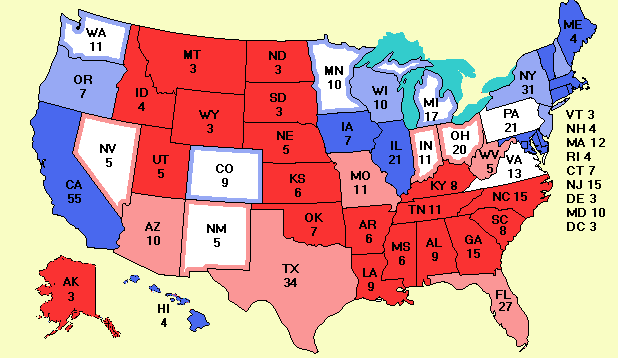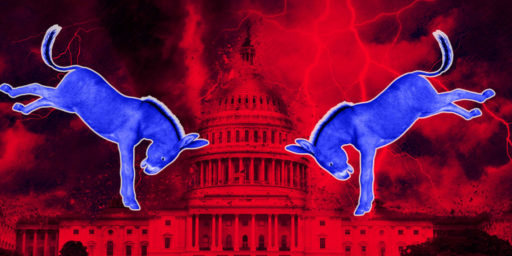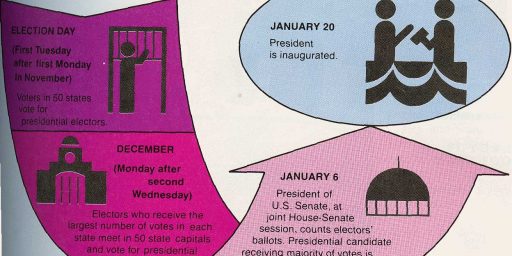Killing the Electoral College?
McCain-Palin currently have a very slim lead over Obama-Biden in virtually every national poll (see RealClearPolitics and Pollster.com). The Electoral College is too close to call. RCP has it 273-265 for Obama (without toss-ups) while Electoral-Vote.com has it 257-247 for McCain with Virginia and Pennsylvania too close to call.
Obviously, there’s still a lot of campaigning to do and dramatic events like yesterday’s financial sector collapses could also have significant impact on the race. If, however, things remain close, we could, for the second time in three elections, have the popular vote winner lose.
This has Steven Taylor thinking:
Would that at all prompt reform of the EC, given that both parties will have suffered that fate in less than a decade? Would the public start to actually wonder about the system by which we elect out presidents?
Before the 2000 elections, I routinely predicted to my Intro to American Government classes that, if the popular vote winner were ever to lose in the modern media era, the Constitution would be amended forthwith to abolish the Electoral College. I was, of course, spectacularly wrong.
Why? Well, I’d forgotten the most fundamental rule of public policy making: What’s important isn’t what the mass opinion is on a subject but rather who cares most about it. Even though Al Gore lost a heartbreaker and his supporters thought they’d been robbed, they could not muster the sustained action to do something about the issue. Meanwhile, there were very entrenched interests in favor of the status quo.
It’s very, very hard to amend the Constitution. You need to get supermajorities in both Houses of Congress and then get approval in 38 of the 50 state legislatures.* Both of these are incredibly unlikely in this particular case. Those who want to abolish the Electoral College are doing so out of general principle. Meanwhile, those who benefit from the current system include: 1) the very small states, who would be ignored in a popular vote system but who get the same two votes in the Senate (and Electoral College) as everyone else; 2) the very large states, who are much more attractive as block votes than as citizens 1+1+1; and 3) swing states, who vary from cycle to cycle, who get a lot of attention foisted on them but who wouldn’t matter nearly as much if it were a truly national race.
______________
*There’s also the state convention model, which has not been attempted. And, some would say, you could get 5 Justices of the Supreme Court to simply fiat an amendment. For simplicity, we’ll ignore those.







I used to make the same prediction in class. What surprised me at the time was less that entrenched interests were opposed, but that there seemed to be far less general discontent in the electorate than I expected.
And, as I noted in the post yesterday, I am not so sure that a repeat would generate much of a call for change, either.
While I wholly concur that reform is highly unlikely, I do think it is possible, even with the institutional barriers, if there is sufficient popular discontent. I am just no longer certain I know (as I thought I did pre-2000) what that would take.
Why not just increase the membership of the House, and therefore the electoral college? This would ameliorate the undesirable effects of the electoral college while preserving its positive attributes, all without requiring an amendment to the constitution.
The Popular Vote would be a big boon to states with high populations. Politicians would do a lot of favors in these states, so that a candidate that would likely lose in California (and lose all the EC votes), for example, could still campaign to get one or two extra million popular votes.
I’m not sure how many people see this as a big change, but I think it would lessen much of the influence of mid to lower population states. It becomes a ‘States Rights’ issue versus the popular vote mantra ‘let every vote be counted’
Perhaps the only thing that would generate enough committed support to actually change Article II/the 12th Amendment would be if we ended up with a 269-269 tie and the election was thrown into the House.
Even then, I’m not sure it would be enough.
Three quarters of the states would need to go along. It’s hard for me to envision the rest of the states ceding the right to elect the president to California, New York, and a handful of big states.
Because unless you remove the winner-take-all delegate allocation, you’re still not going to follow the national popular vote, so it doesn’t really change the situation.
Again, if you remove the winner-take-all allocation of delegates, which you would have to do for a national popular vote, then state borders become meaningless. States with high populations won’t benefit, just areas of high population densities, where you get more individual exposure per dollar or per visit. Rural America would be largely ignored, because it wouldn’t be cost-effective to campaign there.
True, but the Constitution already permits each state to determine the method of election for its electors. Whether a state goes with a “winner take all” approach is left up to the state itself. (Maine and Nebraska do not.) So in theory it’s already possible for states that would fare better with a proportional approach to go that route. But what would the state gain by making the switch? More election stops?
Areas of highest population, which denotes mostly a handful of states. These would be given a disproportinate amount of ‘favor’ from politicians. More so than warranted by just the larger population.
You’re helping to make the case here as to why 3/4 of the states wouldn’t support this.
Depends on how the states choose to allocate, I suppose. If it’s proportional to the state-wide vote, then you might get more stops, if it’s per district winner-take-all vote, you’ll probably get less, or at least more geographically concentrated stops.
There are plenty of rural areas in New York and California, that will vote differently from the people in NYC and LA. There will be no “California” vote, or “New York” vote. Population centers, not populous states, will get the focus of politicians. For example, while Obama probably won’t focus too much on Georgia this year, but if it were a national popular vote he’d be sure to make several stops in Atlanta.
Yes, I know. I don’t believe the EC will be changed any time soon, nor do I necessarily think it should.
Population Centers… True, which places even more focus on an even smaller area, and subsequently narrower focus of politician’s attention.
I don’t think we can really truly see how the dynamics of politics would change until after such a change would happen. I think there would be negative affects on states rights, however, for a majority of the states.
I don’t know about state’s rights, but certainly there are many that would be largely irrelevant to the Presidential selection process. But then again, the President’s job isn’t to advocate a state’s interest, the states have senators and representatives for that.
Why not just increase the membership of the House, and therefore the electoral college?
“Because unless you remove the winner-take-all delegate allocation, you’re still not going to follow the national popular vote, so it doesn’t really change the situation.”
Even so, by having the electoral delegation more closely represent the states relative population, you decrease the likelihood that a candidate will win the electoral college but lose the popular vote. For instance, if the House had 870 members instead of 435, Al Gore would have won the Electoral College in 2000 by 528-482. If you go by Districts+2, Bush would have won 286-252
(source http://www.polidata.org/maps/cd00p1cr.gif). There is no perfect solutions, and I wouldn’t substitute my opinion for the founders wisdom, it just seems like an idea with a low activation energy that would improve results. I imagine the rural states would still buck, but the notion of picking up a couple extra seats might appeal to aspirational local politicians.
So basically you’re advocating diluting the value of the senate seats? At that point, leave the number of house seats alone, and just remove the senate seats from a state’s delegate allocation, and you will at least have delegates proportional to a state’s population.
It would also cut Alaska’s representation by 2/3. I don’t think that proposal would pass constitutional ratification either.
That’s because Gore is a major-league putz. This time around we have Bulldog Sarah, who won’t take no crap from a loser like Hussein.
Is someone here actually calling to increase the number of members of Congress?
With a current approval rating in the single digits, a doubling of the number of Congressmen should lead to a negative approval rating.
It would also lead to further obfuscation, rent-seeking, ear-marking, and pomposity. None of these are good things. Foreign policy, crafted by 900+ ‘secretaries of state’ would be something to behold, though….
This, in my view, would be a textbook instance of the cure being worse than the disease.
The only states that might benefit are those who are now slam dunks for one side or the other and thus get short shrift. But why would California, for example, want to give up the power being a 55 votes out of the necessary 270 gorilla? For the money from campaign visits?
At its core, that’s really the issue. I’m not advocating abandoning the Connecticut Compromise, and removing the two “senatorial” votes would take a change to the Constitution, which I think is highly unlikely in this issue. Just trying to apply Occam’s Razor to the issue. Article I already gives Congress the power to increase its membership, why not just do so.
(And at the risk of opening up a whole tangential conversation, I think the citizenry would benefit from greater representation in the house. A very large house would be harder to “manage” by special interests, and would likely be a more appealing form of service for citizen representatives.
Even then, I’m not sure it would be enough.
Outrage about the system will swell if and when a Democrat becomes president despite losing the popular vote. Not before then.
by this you must mean that only Republicans are effective at solving hard problems 😉
Hell, five of ’em fiated an election, no reason they couldn’t do an amendment…
(Joking)
I’m not one of those who think the candidate who wins the popular vote should necessarily win the election. I think our founders had the right idea about protecting small States. The winner takes all seem not quite right to me either. One alternative would be that The 2 Senate electoral vote would be allocated to the winner of the state and the rest would be allocated proportional.
Most people are exposed to a candidate via the media, not personal appearance. Candidates could still go to the rural areas and know that their appearance is seen by many more on TV and the web. Given how powerful the “candidate just like me” meme is to winning the presidency, we’d probably see politicians spending more time in “home town” settings where he or she appears to be among the people rather than spending all their time with big-city elites. So I’m not at all convinced that small states or low density populations would be “forgotten”. As it stands right now, however, only people in the few key battleground states get ANY face time with the candidates.
Democrats are still sore about the 2000 EC loss, if it happens to the Republicans as well then, and only then, would a consensus begin to form to change the EC.
The biggest obstacle to changing the EC has nothing to do with national, state or even personal interests–it’s sheer cultural inertia. The EC is uniquely American, its what we do that no one else does. Such sentiments have overridden rationality more than once in this country.
And some states are flirting with by-passing the EC altogether:
I don’t the current status of this effort.
Isn’t it interesting that the biggest supporters of going with the popular vote in the General election, still maintain what can only be described as a convoluted primary system, designed to overcome the popular vote, and that without that system Hillary Clinton would be the Democart nominee?
She didn’t win the popular vote unless you count the votes where Obama wasn’t on the ballot, and that hardly seems consistent with the entire notion of a popular vote.
I’ll agree with you that the primary system is far more broken than the EC, starting with the taxpayer funding the party’s primaries and caucuses.
Eliminating the Electoral College and going to the popular vote would mean that every vote of every citizen is utterly equal. As such, it is nonsensical to speak of CA or NY electing the president. The borders of the states wouldn’t make any difference in terms of the vote itself.
If one is arguing that the more populated parts of the country would have an impact on the election directly proportional to the size of the population in question, well that has a name: democracy.
This is to be contrasted, by the way, with a system that weighs the vote of some citizens (e.g., Alaskans) as counting more that the votes of citizens.
Or, a system that basically walls off large numbers of voters from having a direct effect on the outcome (e.g., Republicans in CA or Democrats in TX).
That this is unlikely to change anytime is no surprise, that people so readily defend the system as superior to other ways of electing chief executives is curious (to me, at least). No doubt some will (and have) disagree.
Give me a break Steven–The REAL America is in places like Alaska, Wyoming, and the small town America that patriots like Sarah Palin have led.
The cities–while they generate most of the country’s wealth and culture–are filled with liberals and immigrants and are, by their very definition, cesspools of iniquity and evil.
If we let those clowns have a equal vote, it would be like Israel letting inhabitants of the occupied territories vote: We would be sent a-packing by the cabal of cosmopolitan community organizers.
“”financial sector collapses could also have significant impact on the race.””
“”””””””””””””””””””””””””””””””””””””””””””””””””
KRAMER for PRESIDENT!!
We’re still going to have to vote in November – right?
Yes, but as we’ve said before, democracy does not necessarily translate to liberty.
“If one is arguing that the more populated parts of the country would have an impact on the election directly proportional to the size of the population in question, well that has a name: democracy.â€
Yes and the U.S. is a Republic. Are you suggesting we overthrow our Government? Perhaps you think we should do away with State’s borders entirely?
Our founding fathers design this system to have a weak Central Government. It was originally design around the individual rights first then local then State then lastly Federal rights. Unfortunately we have lost that wisdom. We have allowed the central government to become way too powerful and that will be our ultimate downfall.
The Articles of Confederation were designed to have a weak central government, the Constitution was designed to make a stronger one.
I don’t see the electoral college being changed to popular vote-for one thing too many small states would be voting against their self interest.
One of my favorite solutions would be a state level one, and that is to divide the electoral college votes by congressional district with the third going to the popular vote winner state wide. I think a couple of states already do this.
But I don’t see a move towards a popular vote winner having much success.
Stronger than the Articles of Confederation but weak compare to other governments.
you all have missed the best reason for keeping the EC. We localize any voting problems. Every voting system has an error rate. Let us assume that the error rate is 1%. (this is lower than some and higher than others)
Any national election within the error rate would have to have a manual recount and subject our largest cities (chicago, new york, seattle, LA) to intense questions about the way we vote. Fact is it would take the lawyers and Supreme court about a year or two to count the votes of any election. Can you imagine an recount involving Chicago?
And I haven’t even gotten to voter registration law.
Yes the borders do make a difference. If a standing president promises and provide a big block of funding to California, for example, right before an Election, those in Nevada get no benefit. Its a vote is a vote, but the political favors and spending would be applied to the larger populace states and cities.
How about — Papoon for President, You know he’s not insane.
(at least Bithead should get that one)
Heh. I was gonna write something to the effect at my own place, but In searching around, I found someone had already beat me to it.
How about NO.
Our nation is a Republic, made of States, it is not a TV game show or a football game between red and blue. There are reasons for the complexity of our government. We should not “dumb down” the system we’ve built over the past 230+ years just because you want a nice TV event that you can watch at a TV party as if it were the Superbowl.
Read the Constitution, the Articles of Confederation, the Bill of Rights, and the Federalist Papers. Pick up a history book. If you don’t understand our government, don’t know the job of the President, and don’t care how it all works, why are you voting?